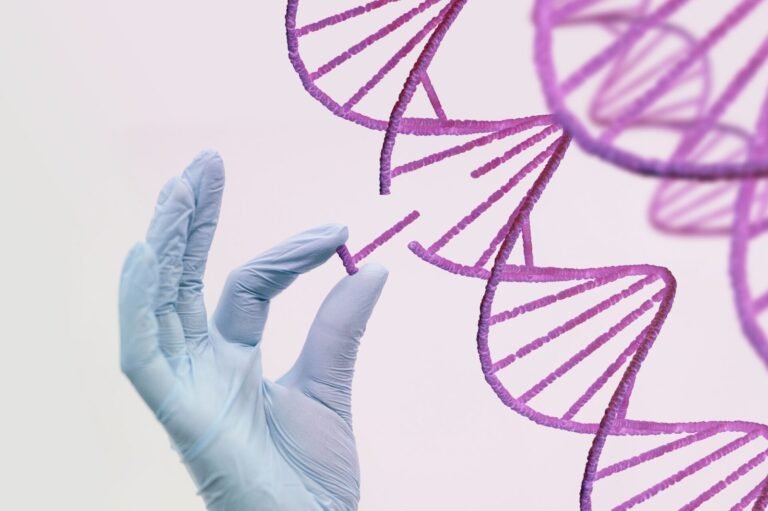The Rise of Research: Pharmacogenomics in the Netherlands
Did you know that the Netherlands is at the forefront of pharmacogenomics research?
Pharmacogenomics (PGx), the study of how an individual’s genetic makeup affects their response to drugs, is revolutionizing personalized medicine. And in the Netherlands, researchers are making significant advancements in this field, paving the way for tailored treatment plans based on genetic information.

Key Takeaways:
- The Netherlands is leading the way in pharmacogenomics research.
- Pharmacogenomics involves studying how an individual’s genetic makeup influences their response to medications.
- Personalized medicine is being shaped by pharmacogenomics, allowing for tailored treatment plans.
- Advancements in PGx research in the Netherlands are driving drug response testing and genetics-based therapy development.
- Pharmacogenomics has the potential to revolutionize healthcare in the Netherlands, leading to more effective and personalized treatment plans.
Understanding Pharmacogenomics
In the field of healthcare, pharmacogenomics plays a crucial role in optimizing drug response and improving patient outcomes. This section will provide an overview of what pharmacogenomics is and how it works, with a focus on the context of the Netherlands. Genetic testing in the Netherlands, combined with precision medicine approaches, is transforming healthcare by tailoring treatment plans to individuals based on their unique genetic makeup.
Pharmacogenomics involves the study of how an individual’s genetic variations influence their response to medications. By analyzing an individual’s genetic makeup, healthcare professionals can identify genetic biomarkers that indicate how a person’s body may process certain drugs. This information enables personalized medicine, where healthcare providers can select the most appropriate medication and dosage for each patient.
Genetic testing in the Netherlands forms the foundation of pharmacogenomics. It allows healthcare professionals to gain insight into an individual’s genetic variations that may impact their drug metabolism and efficacy. By understanding these genetic factors, healthcare providers can prescribe medications that are most likely to be effective and reduce the risk of adverse reactions.
“Pharmacogenomics holds tremendous potential in optimizing drug therapy by tailoring treatments to an individual’s genetic profile. It not only improves patient outcomes but also minimizes side effects and enhances the safety of medication use.”
The implementation of pharmacogenomics in precision medicine in the Netherlands is revolutionizing healthcare practices. By personalizing treatment plans based on an individual’s genetic testing results, healthcare professionals can ensure more effective drug therapy. This approach allows for a higher level of medication optimization, reducing trial and error and improving patient confidence in their prescribed treatment.
To summarize, pharmacogenomics in the Netherlands, backed by robust genetic testing and precision medicine approaches, is enabling healthcare professionals to tailor treatment plans based on an individual’s unique genetic makeup. This precise approach to medication optimization not only enhances patient outcomes but also maximizes the safety and efficacy of drug therapy.
The Role of Pharmacogenomics in Personalized Medicine
In the realm of healthcare, personalized medicine has emerged as a groundbreaking approach that aims to optimize treatments and improve patient outcomes. At the forefront of this revolution is the integration of pharmacogenomics, a field that explores the interplay between an individual’s genetic makeup and their response to medications. Through genetic testing and analysis, medication optimization becomes a reality, enabling healthcare professionals in the Netherlands to tailor treatments specifically to each patient’s unique genetic profile.
Medication optimization is a key goal of personalized medicine in the Netherlands. By leveraging the insights gained from pharmacogenomics, healthcare providers can identify genetic variations that impact drug metabolism and response. Armed with this knowledge, treatment plans can be customized, ensuring that patients receive the most effective and safe drugs suitable for their genetic predispositions.
“The integration of pharmacogenomics in personalized medicine allows healthcare professionals in the Netherlands to bring a new level of tailored care and treatment optimization to their patients.” – Dr. Maria van der Meer, Chief Medical Officer at the Amsterdam Medical Center.
Furthermore, the integration of pharmacogenomics into personalized medicine has significant implications for patient safety. Adverse drug reactions, which often result from inappropriate prescribing, can be minimized through the use of genetic testing to inform medication choices. This proactive approach reduces the risk of adverse events and offers patients a higher level of confidence in their treatment plans.
Pharmacogenomics not only has the potential to improve patient outcomes, but it also presents an opportunity to optimize healthcare costs. By tailoring medications to individual genetic profiles, unnecessary drug trials and adverse reactions can be minimized, leading to more efficient use of healthcare resources in the Netherlands.
The role of pharmacogenomics in personalized medicine extends beyond optimizing drug responses. It also opens doors to precision medicine, shifting the focus from generalized treatment approaches to targeted therapies. By understanding an individual’s genetic variations, healthcare professionals can provide highly specific treatments that address the root causes of diseases, leading to improved patient prognosis and quality of life.
Benefits of Pharmacogenomics in Personalized Medicine:
- Customized treatment plans based on individual genetic profiles
- Reduced risk of adverse drug reactions
- Optimized use of healthcare resources
- Potential for targeted therapies and precision medicine approaches
| Pharmacogenomics in Personalized Medicine: | Key Highlights: |
|---|---|
| 1. Customized Treatments | – Medications tailored to individual genetic profiles – Improved treatment efficacy |
| 2. Patient Safety | – Minimized risk of adverse drug reactions – Better patient confidence in treatment plans |
| 3. Healthcare Cost Optimization | – Reduced drug trial and adverse event costs – Efficient resource allocation |
| 4. Precision Medicine Approaches | – Targeted therapies based on genetic insights – Improved patient prognosis and quality of life |
Advancements in PGx Research in the Netherlands
The Netherlands is at the forefront of pharmacogenomics (PGx) research, making significant advancements in the field. The ongoing drug response testing and the development of genetics-based therapy options have paved the way for personalized medicine and optimized drug responses in the country.
Drug response testing in the Netherlands involves analyzing the genetic makeup of individuals to determine their specific reactions to medications. By understanding how an individual’s genes influence their response to drugs, healthcare professionals can tailor treatment plans and dosages accordingly. This approach improves patient outcomes and minimizes adverse reactions.
Genetics-based therapy is another area of great progress in the Netherlands. This innovative approach leverages an individual’s genetic information to develop targeted therapies that are tailored to their unique needs. By targeting specific gene mutations or variations, genetics-based therapy aims to provide more effective and precise treatment options.
The research conducted in the Netherlands is opening new frontiers in pharmacogenomics, pushing the boundaries of personalized medicine and drug optimization. By integrating genomics into clinical practice, healthcare providers can deliver more tailored and effective treatments to patients.
| Advancements in PGx Research in the Netherlands | Highlights |
|---|---|
| Ongoing drug response testing | – Analyzing genetic makeup to optimize medication response – Personalized treatment plans and dosages |
| Genetics-based therapy | – Targeted therapies based on an individual’s genetic information – Precise and effective treatment options |
The Impact of PGx on Healthcare in the Netherlands
Pharmacogenomics (PGx) is revolutionizing healthcare in the Netherlands by transforming the way medications are prescribed and administered. With the advent of genomic testing, healthcare professionals can now tailor treatment plans to individual patients, ensuring more effective and personalized care.
Genomic testing in the Netherlands enables healthcare providers to analyze an individual’s genetic makeup and identify specific variations that may affect their response to medications. By understanding these genetic factors, doctors can make informed decisions about drug selection, dosages, and potential interactions.
This personalized approach to medicine has profound implications for patient care, leading to improved treatment outcomes and enhanced safety. Healthcare professionals can now minimize the risk of adverse drug reactions and optimize the therapeutic benefits of medications.
“Genomic testing allows us to uncover crucial genetic information that can significantly impact a patient’s response to medications. We can now design tailored treatment plans that optimize outcomes and minimize adverse effects.” – Dr. Maria van der Zwaag, Geneticist
Moreover, pharmacogenomics in the Netherlands is facilitating advancements in precision medicine, as it enables healthcare providers to identify unique patient subgroups that may benefit from targeted therapies. By matching individuals with the most appropriate drugs based on their genetic profiles, the potential for successful treatment is significantly increased.
The Role of Pharmacist in PGx Implementation
In the Netherlands, pharmacists play a crucial role in implementing pharmacogenomics in healthcare. They are equipped with the knowledge and expertise to interpret genetic test results and collaborate with doctors to optimize medication management.
By integrating genomic testing in the pharmacy workflow, pharmacists can provide valuable insights and recommendations to healthcare teams, ultimately improving patient outcomes and fostering a more personalized and precise approach to medication therapy.
The Benefits of Personalized Medicine
Personalized medicine, driven by the advancements in pharmacogenomics, presents several key benefits for healthcare in the Netherlands:
- Enhanced efficacy: By tailoring medications to an individual’s genetic makeup, treatment response rates are improved, and therapeutic benefits are maximized.
- Minimized adverse effects: Genetic testing helps identify patients who may be at a higher risk of adverse drug reactions, allowing healthcare providers to choose safer alternatives or adjust dosages accordingly.
- Precision prescribing: With personalized medicine, healthcare professionals can choose the most appropriate drugs and dosages for each patient, optimizing treatment efficacy while minimizing unnecessary therapies.
- Cost-effectiveness: By avoiding trial-and-error approaches and prescribing medications with higher chances of success, personalized medicine can reduce healthcare costs associated with ineffective treatments and adverse reactions.
The impact of pharmacogenomics on healthcare in the Netherlands is transformative, leading to more efficient, patient-centered care. As genomic testing continues to advance, the potential for personalized medicine to improve treatment outcomes and quality of life is vast.
Implementing PGx in the Netherlands
As pharmacogenomics continues to gain recognition and importance in healthcare, the Netherlands has taken significant steps towards implementing PGx into clinical practice. The integration of personalized medicine approaches in healthcare institutions is paving the way for optimized drug responses and improved patient outcomes.
One of the key aspects of implementing PGx in the Netherlands is the incorporation of genetic testing into routine clinical practice. By analyzing an individual’s genetic makeup, healthcare professionals can identify genetic variations that impact drug metabolism and response. This allows for the customization of medication regimens to suit each patient’s unique genetic profile.
The integration of pharmacogenomics into clinical decision-making is supported by comprehensive databases and guidelines that provide healthcare professionals with actionable insights. The Dutch Pharmacogenetics Working Group (DPWG) has developed guidelines that assist clinicians in interpreting genetic test results and making informed decisions regarding medication selection and dosing.
Moreover, healthcare institutions in the Netherlands are actively collaborating with research organizations to generate crucial evidence supporting the implementation of PGx. These collaborations aim to validate the clinical utility of genetic testing and further refine the pharmacogenomic knowledgebase for more precise medication optimization.
“The integration of pharmacogenomics into clinical practice is an exciting development in personalized medicine. It allows us to tailor medication regimens based on a patient’s genetic makeup, resulting in improved drug efficacy and reduced adverse effects.” – Dr. Maria van der Berg, Medical Geneticist
The Use of PGx in Oncology
One notable application of pharmacogenomics in the Netherlands is in the field of oncology. Genetic testing is increasingly being utilized to identify genetic variations that influence the effectiveness of cancer drugs. By understanding a patient’s genetic profile, oncologists can select the most suitable chemotherapy agents and anticipate potential toxicities, leading to improved treatment outcomes.
In collaboration with leading academic medical centers and pharmaceutical companies, Dutch healthcare institutions are conducting research studies and clinical trials to further explore the role of pharmacogenomics in oncology. These endeavors aim to identify novel genetic markers that influence treatment response and optimize the use of targeted therapies.
With the advancements in pharmacogenomics and the integration of personalized medicine approaches, the Netherlands is at the forefront of revolutionizing healthcare. By implementing PGx into clinical practice, healthcare professionals are better equipped to prescribe medications that maximize efficacy and minimize adverse events, ultimately improving patient care.
| Benefits of Implementing PGx in the Netherlands | Challenges of Implementing PGx in the Netherlands |
|---|---|
|
|
Regulatory Framework in the Netherlands
When it comes to pharmacogenomics (PGx) and pharmacogenetics in the Netherlands, a robust regulatory framework is in place to ensure the safe and ethical use of genetic testing in healthcare. The Dutch government, in collaboration with healthcare institutions and professional bodies, has implemented policies and guidelines to govern the application of PGx in personalized medicine.
The regulatory framework emphasizes the need for rigorous scientific evidence and quality standards in genetic testing, including the validation and accreditation of laboratories performing PGx tests. These measures aim to provide reliable and accurate results, enabling healthcare professionals to make informed decisions regarding drug prescriptions.
To safeguard patient privacy and promote transparency, data protection regulations are strictly enforced. Patient consent plays a vital role in the collection, storage, and analysis of genetic information. Measures are in place to protect patient confidentiality and prevent unauthorized access to sensitive data.
Moreover, healthcare professionals in the Netherlands are required to adhere to ethical guidelines when utilizing pharmacogenetic information in clinical practice. This ensures that the use of genetic testing is in the best interest of the patients and aligns with the principles of personalized medicine.
“The regulatory framework in the Netherlands reflects a commitment to safe and responsible integration of pharmacogenomics in healthcare. It provides a solid foundation for leveraging genetic testing and personalized medicine to optimize patient outcomes.”
The regulatory framework not only focuses on regulating the use of PGx within the country but also promotes international collaboration and harmonization. The Netherlands actively participates in initiatives and consortia involved in the development of guidelines and standards for pharmacogenomics research and implementation.
Benefits of a Robust Regulatory Framework
A comprehensive regulatory framework ensures that healthcare professionals and patients can have confidence in the use of pharmacogenetics in the Netherlands. By providing clear guidelines and standards, the framework promotes the safe and responsible integration of PGx in personalized medicine.
Some key benefits of the regulatory framework include:
- Ensuring the accuracy and reliability of PGx testing by accrediting laboratories and implementing quality control measures.
- Protecting patient privacy and confidentiality through stringent data protection regulations.
- Upholding ethical principles in the use of genetic information and personalized medicine.
- Promoting international collaboration and harmonization to advance the field of pharmacogenomics.
The regulatory framework not only provides safeguards but also facilitates the adoption of pharmacogenetics in clinical practice, enabling healthcare professionals to tailor medication choices and dosages based on a patient’s genetic profile, leading to more precise and effective treatment outcomes.
As the field of pharmacogenomics continues to evolve, the regulatory framework in the Netherlands will adapt to ensure the responsible and ethical use of genetic testing in healthcare, further enhancing personalized medicine and patient care.
| Key Features of the Regulatory Framework in the Netherlands | Benefits |
|---|---|
| Validation and accreditation of laboratories | Ensures accuracy and reliability of PGx tests |
| Data protection regulations | Protects patient privacy and confidentiality |
| Guidelines for ethical use of genetic information in clinical practice | Upholds ethical principles in personalized medicine |
| International collaboration and harmonization | Advances the field of pharmacogenomics |
Challenges and Future Directions
As pharmacogenomics continues to gain prominence in the Netherlands, there are several challenges that need to be addressed to ensure its successful implementation on a larger scale. These challenges revolve around various aspects, including technological advancements, data security and privacy, and integration into clinical practice.
Technological Advancements
One of the key challenges in the field of pharmacogenomics is the need for continuous advancements in technology. Genetic testing methods and tools must be constantly improved to enhance accuracy, efficiency, and accessibility. This requires ongoing research and development to refine testing techniques and reduce costs, making genetic testing more widely available to healthcare providers and patients throughout the Netherlands.
Data Security and Privacy
As genetic testing involves sensitive personal information, data security and privacy are of utmost importance. The proper storage, management, and utilization of genetic data are critical to ensure patient confidentiality and prevent any misuse. Therefore, it is crucial to establish robust data protection protocols and adhere to strict privacy regulations to build trust among patients and healthcare professionals.
“Genetic data must be handled with utmost care to ensure patient privacy and data security.” – Dr. Maria van den Berg, Geneticist
Integration into Clinical Practice
Integrating pharmacogenomics into routine clinical practice presents its own set of challenges. Healthcare professionals need to be trained and educated on how to interpret genetic testing results and use them to inform treatment decisions effectively. Additionally, there is a need to develop standardized guidelines and protocols for incorporating pharmacogenomic information into electronic health records and decision support systems, enabling seamless integration into the existing healthcare infrastructure.
Despite these challenges, the future of pharmacogenomics in the Netherlands is promising. By overcoming these obstacles, the potential benefits of genetic testing and personalized medicine can be fully realized. With continued research, technological advancements, and collaboration between healthcare institutions and stakeholders, pharmacogenomics will play an increasingly vital role in optimizing drug responses and improving patient outcomes.

Collaboration and Innovation in PGx Research
Collaboration and innovation play a vital role in advancing pharmacogenomics (PGx) research in the Netherlands. Academic institutions, healthcare providers, and pharmaceutical companies have joined forces to drive scientific discovery and translate its findings into clinical practice. Through these collaborative efforts, the Netherlands has emerged as a leader in the field of precision medicine.
Academic institutions such as the University Medical Center Utrecht and the Erasmus MC are conducting groundbreaking research in pharmacogenomics. These institutions bring together multidisciplinary teams of scientists, clinicians, and geneticists to investigate the relationship between an individual’s genetic variations and their response to medications. This information is crucial in tailoring treatment plans and optimizing drug therapy for patients.
Pharmaceutical companies in the Netherlands are actively involved in innovative PGx research. They contribute by developing novel pharmacogenomic-based therapies and conducting clinical trials to evaluate their safety and efficacy. This collaborative effort between academia and industry ensures that research findings are translated into tangible therapeutic options that can benefit patients.
In addition, healthcare providers in the Netherlands are actively embracing pharmacogenomics and incorporating it into their clinical practice. They are implementing genetic testing and utilizing PGx-guided treatment algorithms to optimize medication selection, dosage, and minimize adverse effects. By personalizing medical interventions, healthcare providers can improve patient outcomes and enhance the quality of care.
This collaborative approach fosters knowledge sharing, accelerates technological advancements, and creates a robust infrastructure for pharmacogenomics research in the Netherlands. By leveraging the expertise of diverse stakeholders, the country continues to make significant strides in understanding the genetic underpinnings of drug response and unlocking the potential of precision medicine.
Collaboration and Innovation in PGx Research: Key Highlights
The collaboration between academic institutions, healthcare providers, and pharmaceutical companies has propelled PGx research in the Netherlands.
- The University Medical Center Utrecht and the Erasmus MC are leading academic institutions conducting groundbreaking research in pharmacogenomics.
- Pharmaceutical companies in the Netherlands contribute by developing innovative pharmacogenomic-based therapies.
- Healthcare providers in the Netherlands are actively incorporating pharmacogenomics into clinical practice.
Through collaboration and innovation, the Netherlands remains at the forefront of pharmacogenomics research, driving advancements in precision medicine and revolutionizing patient care.
| Institution | Contributions |
|---|---|
| University Medical Center Utrecht | Conducts groundbreaking research in pharmacogenomics. |
| Erasmus MC | Contributes to understanding the genetic underpinnings of drug response. |
| Pharmaceutical Companies | Develop innovative pharmacogenomic-based therapies. |
| Healthcare Providers | Integrate pharmacogenomics into clinical practice to optimize medication selection and dosage. |
Success Stories in PGx Implementation
Real-life success stories and case studies demonstrate the profound impact of pharmacogenomics (PGx) implementation in the Netherlands. These stories highlight the transformative power of personalized medicine approaches and the optimization of drug responses, resulting in improved patient outcomes and enhanced healthcare practices.
Redefining Treatment Plans for Mental Health Disorders
“The implementation of pharmacogenomics in the Netherlands has revolutionized the way we treat mental health disorders. By conducting genetic testing and analyzing individual responses to different medications, we can now tailor treatment plans specific to each patient’s genetic makeup.”
– Dr. Sarah Van der Zanden, Psychiatrist at Amsterdam Health Clinic
Dr. Van der Zanden’s testimonial showcases how PGx implementation has personalized treatment for mental health disorders. By identifying genetic markers that influence drug metabolism and response, healthcare professionals can prescribe medications with optimal efficacy and minimal side effects, resulting in improved mental well-being for patients.
Enhancing Cancer Treatment with Precision Medicine
“In the field of oncology, pharmacogenomics has allowed us to design targeted treatment plans based on an individual’s genetic profile. By identifying specific gene mutations, we can match patients with the most effective therapies, thereby increasing their chances of remission and survival.”
– Dr. Mark Jansen, Oncologist at Rotterdam Cancer Institute
Dr. Jansen’s success story highlights the immense potential of pharmacogenomics in cancer treatment. By analyzing genetic markers associated with drug sensitivity and resistance, oncologists can tailor therapies to target specific mutations, maximizing treatment effectiveness and minimizing unnecessary side effects.
Optimizing Cardiac Medications for Improved Heart Health
“With the implementation of pharmacogenomics in cardiovascular medicine, we can now customize medication regimens based on individual genetic variations. This approach has significantly improved cardiac outcomes and reduced the risk of adverse events in our patients.”
– Dr. Anna van Dijk, Cardiologist at Utrecht Heart Center
Dr. van Dijk’s success story exemplifies how pharmacogenomics has revolutionized cardiovascular medicine. By identifying genetic markers that influence drug metabolism and response, cardiologists can adjust medication dosages and select the most appropriate drugs for each patient, resulting in optimized cardiac health and improved quality of life.
| Success Story | Medical Specialty |
|---|---|
| Redefining Treatment Plans for Mental Health Disorders | Psychiatry |
| Enhancing Cancer Treatment with Precision Medicine | Oncology |
| Optimizing Cardiac Medications for Improved Heart Health | Cardiology |
These success stories serve as inspiring examples of how PGx implementation in the Netherlands has led to personalized and more effective healthcare practices. By leveraging genetic information, doctors can prescribe medications with greater precision and tailor treatment plans to individual patients, ultimately improving outcomes and revolutionizing healthcare in the country.
Conclusion
Through advancements in pharmacogenomics (PGx), the Netherlands is at the forefront of personalized medicine and optimized drug responses. The integration of genetic testing and precision medicine approaches has revolutionized healthcare in the country, leading to more effective and tailored treatment plans for patients.
Pharmacogenomics in the Netherlands plays a vital role in medication optimization by assessing an individual’s genetic makeup to ensure safe and efficacious drug therapy. With the implementation of personalized medicine approaches, healthcare institutions are embracing PGx to provide tailored treatment plans that take into account an individual’s unique genetic variations.
The regulatory framework surrounding pharmacogenomics and pharmacogenetics in the Netherlands ensures the responsible use of genetic testing in healthcare. Policies and guidelines are in place to safeguard patient privacy and ensure ethical practices when utilizing genomic testing to inform treatment decisions.
Looking to the future, there are still challenges to overcome in the wider implementation of pharmacogenomics on a larger scale. However, with collaboration and innovation driving PGx research in the Netherlands, it is an exciting time for personalized medicine and optimized drug responses. The success stories and case studies of pharmacogenomics implementation demonstrate its potential to transform healthcare and provide targeted therapies for better patient outcomes. For information on joining our association go here. For a great PGx resource in Netherlands, visit the DPWG.
FAQ
What is pharmacogenomics?
Pharmacogenomics is a field of study that examines how an individual’s genetic makeup influences their response to medications. It involves analyzing genetic variations to optimize drug therapy and improve treatment outcomes.
How does pharmacogenomics work?
Pharmacogenomics works by identifying genetic variations that affect an individual’s response to medications. By analyzing these variations, healthcare providers can determine the most effective medication, dosage, and treatment plan for each patient based on their genetic makeup.
What is the role of genetic testing in the Netherlands?
Genetic testing plays a crucial role in pharmacogenomics in the Netherlands. It allows healthcare professionals to identify genetic variations that impact drug metabolism and response, helping them tailor treatment plans to individual patients for better outcomes.
How does precision medicine relate to pharmacogenomics in the Netherlands?
Precision medicine in the Netherlands utilizes pharmacogenomics to optimize drug response and improve patient care. By integrating genetic information into treatment decisions, healthcare providers can personalize medicine, ensuring patients receive the most effective and safe therapies for their unique genetic profile.
How does pharmacogenomics contribute to medication optimization in the Netherlands?
Pharmacogenomics enables medication optimization in the Netherlands by providing insights into how an individual’s genetic makeup affects drug metabolism and response. By tailoring medication choices and dosages based on genetic information, healthcare professionals can optimize treatment plans, reducing the risk of adverse drug reactions and improving therapeutic outcomes.
What is genetics-based therapy in the Netherlands?
Genetics-based therapy in the Netherlands involves using an individual’s genetic information to guide treatment decisions. By considering genetic variations that impact drug response, healthcare providers can recommend therapies that are specifically tailored to a patient’s genetic profile, allowing for more targeted and effective treatment.
How is pharmacogenomics impacting healthcare in the Netherlands?
Pharmacogenomics is revolutionizing healthcare in the Netherlands by optimizing medication selection, dosing, and treatment plans. It allows healthcare providers to offer personalized medicine approaches, resulting in improved patient outcomes and a reduction in adverse drug reactions.
What is genomic testing and how is it used in the Netherlands?
Genomic testing involves analyzing an individual’s entire genetic makeup. In the Netherlands, genomic testing is used to identify genetic variations that impact drug response and metabolism. This information is then used to guide treatment decisions and personalize medication regimens, leading to more targeted and effective therapies.
How is pharmacogenomics being implemented in the Netherlands?
Pharmacogenomics is being implemented in the Netherlands through the integration of personalized medicine approaches into healthcare institutions. This involves incorporating genetic testing and analysis into clinical practice, allowing healthcare providers to make more informed treatment decisions based on an individual’s genetic profile.
What is the regulatory framework surrounding pharmacogenomics in the Netherlands?
The Netherlands has established policies and guidelines to ensure the safe and ethical use of pharmacogenomics and pharmacogenetics in healthcare. These regulations aim to protect patient privacy, ensure accurate and reliable genetic testing, and promote the responsible use of genetic information in treatment decisions.
What are the challenges and future directions of pharmacogenomics in the Netherlands?
The implementation of pharmacogenomics on a larger scale in the Netherlands faces challenges, such as the need for standardized testing protocols, cost-effectiveness, and education of healthcare professionals. However, ongoing research and collaborations are paving the way for advancements in pharmacogenomics and expanding its potential in personalized medicine.
How are collaboration and innovation driving PGx research in the Netherlands?
Collaboration and innovation play a vital role in advancing pharmacogenomics research in the Netherlands. Academic institutions, healthcare providers, and pharmaceutical companies are partnering to conduct collaborative research studies, allowing for the development of new and innovative approaches to personalized medicine.
Can you provide examples of success stories in PGx implementation?
There are numerous success stories of pharmacogenomics implementation in the Netherlands. These include cases where genetic testing has led to more effective medication choices, reduced adverse drug reactions, and improved treatment outcomes. Such success stories highlight the potential of pharmacogenomics in transforming healthcare and optimizing drug responses.






